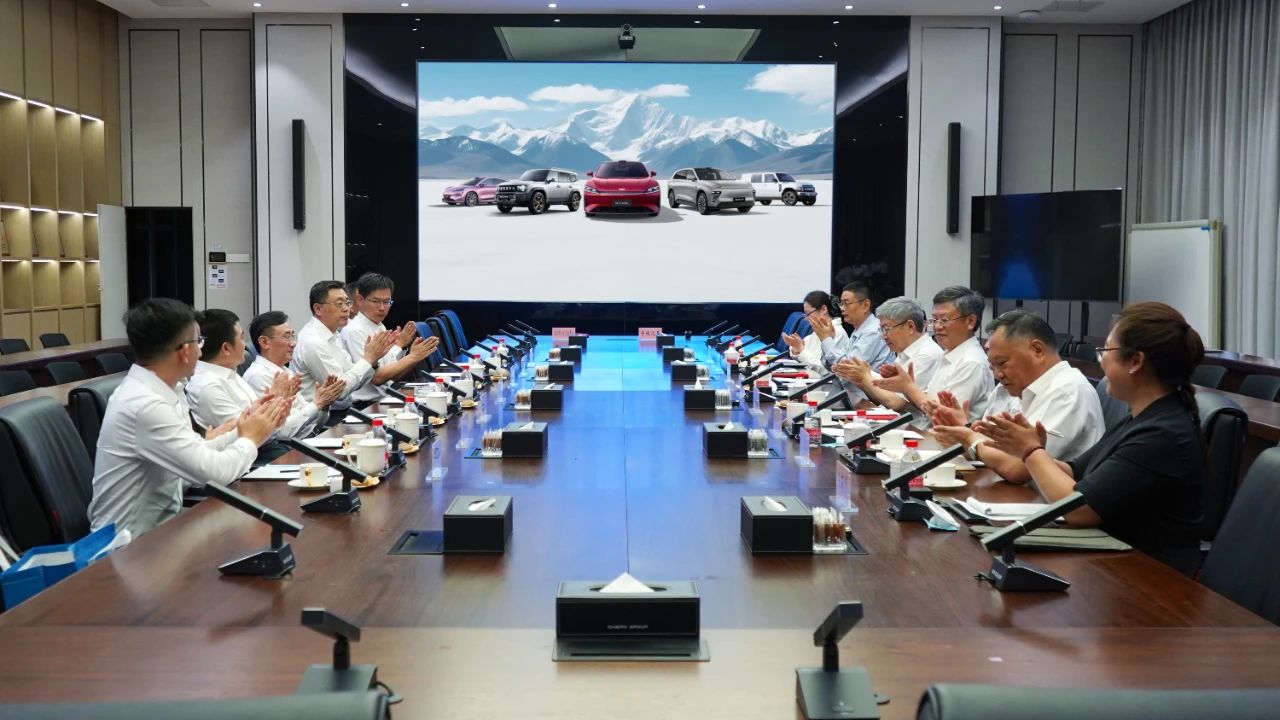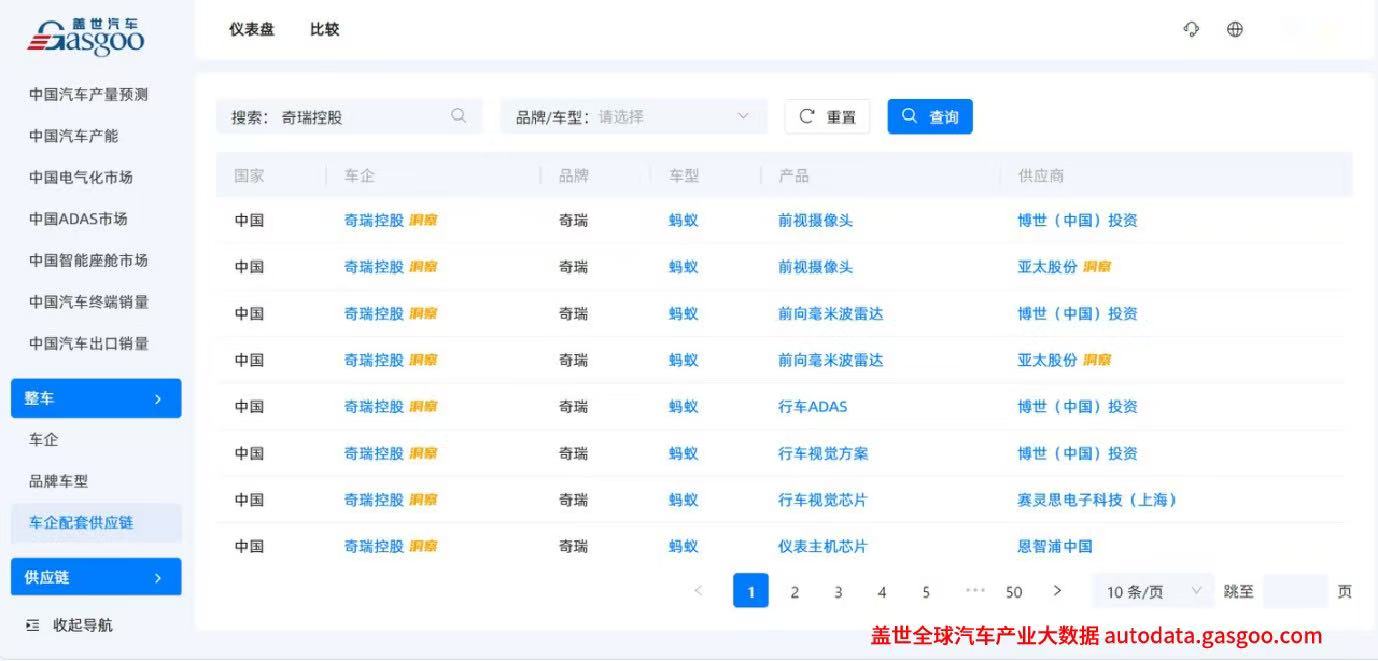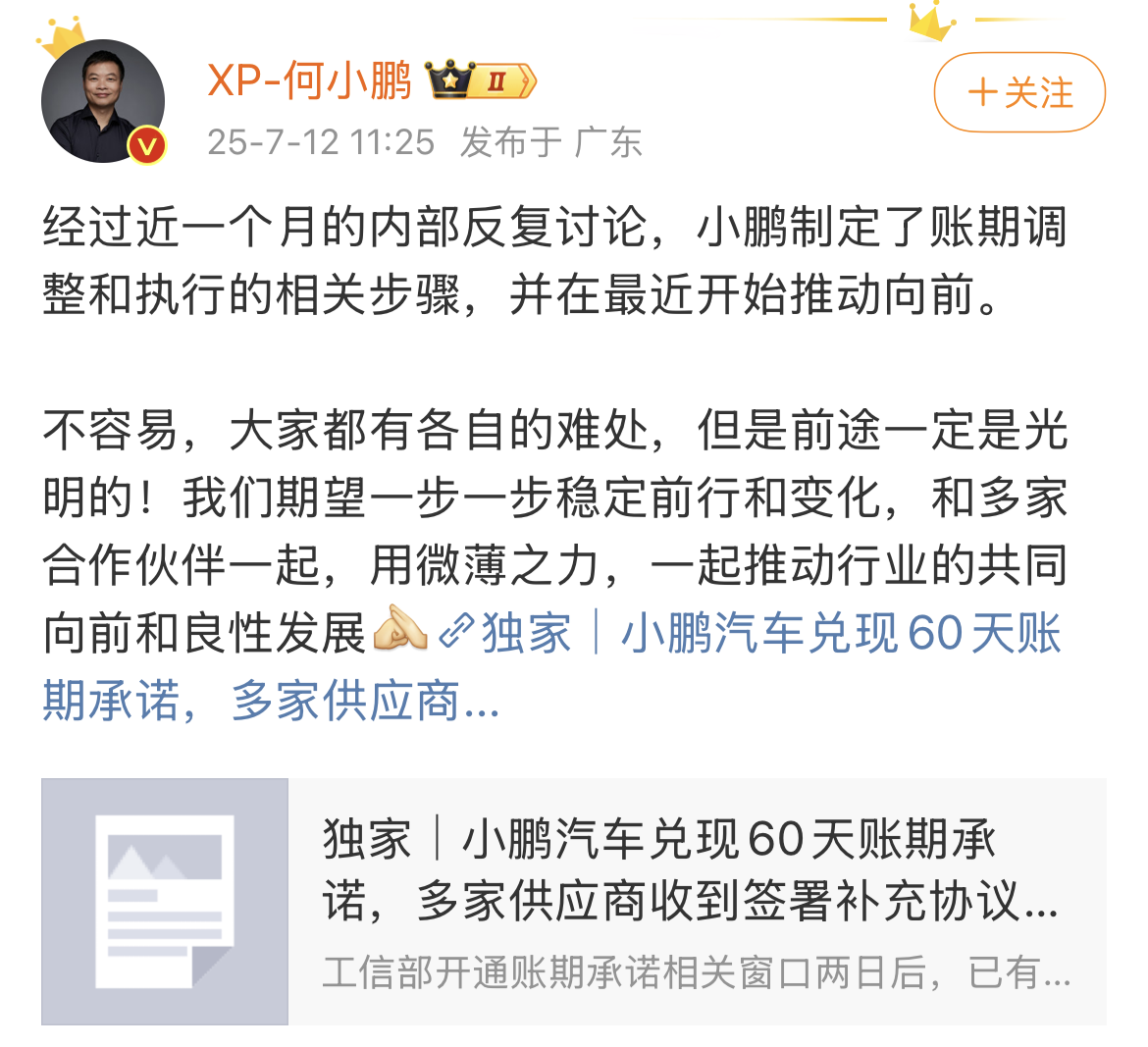Chery Compresses Supplier Payment Terms to 47 Days, Is the Auto Industry’s Chronic Payment Delay Finally Being Solved?
On August 25th, Chery Group announced that from August 22nd to 23rd, the Ministry of Industry and Information Technology conducted a survey at Chery Automobile regarding its production and operation as well as efforts to oppose irrational competition.

The picture shows the scene of the survey symposium.
During this survey, Mr. Yin Tongyue, Chairman of Chery Holding Group Co., Ltd., highlighted the company's practices in optimizing supply chain payments. While experiencing rapid sales growth, Chery has earnestly implemented the requirements of the state and relevant ministries, resolutely optimized supply chain payments, and delivered efficient payments through a "four-pronged approach."
-
Set "≤60 days payment terms" as a standardized and mandatory requirement.
-
Promote efficient collaboration among all departments through full-chain implementation, ensuring a smooth and comprehensive chain review system.
-
Achieve full-process online operations through digitalizing approvals.
-
Using an advance payment mechanism to pay a certain proportion of the prepayment to small and medium-sized enterprises in advance, addressing the issue of insufficient funds for initial production startup.
Chery revealed that by implementing the "four major combination punches," the group has reduced the average payment period for suppliers to 47 days, effectively alleviating the financial pressure on suppliers and promoting the sustainable and healthy development of the supply chain system.The Gai Shi Global Automotive Industry Big Data Platform has collected nearly 500 supplier information entries of Chery Holding. For details, see:autodata.gasgoo.com)。

Automakers actively respond to policies, taking multiple measures to implement the 60-day payment commitment.
Chery's proactive actions are not an isolated case in the industry but a reflection of how automakers are currently responding to national policies and fulfilling social responsibilities.
In June this year, the State Council's revised "Regulations on Ensuring Payments to Small and Medium-sized Enterprises" were officially implemented. In response, 17 major automotive companies nationwide quickly pledged to "keep the payment period for suppliers to no more than 60 days," marking the beginning of standardized payment practices in the industry supply chain. To facilitate the transition of these commitments from "paper" to "implementation," the Ministry of Industry and Information Technology launched an "online issue (suggestion) feedback window for the practice of payment period commitments by major automotive companies" on July 9. This provided suppliers with a direct channel to report issues and effectively supervised the implementation by automotive companies.
Recently, with the 60-day period having passed, the commitment of car companies to payment terms has attracted widespread attention in the industry.
Gasgoo has noticed that recently, the official WeChat account of the Ministry of Industry and Information Technology, "MIIT Micro Report," published an article titled "Automakers Promise 60-Day Payment Terms, How Is the Progress?" The article specifically praised FAW Group, GAC Group, and Seres Group, highlighting the implementation status of these three automakers.
Specifically, in order to implement the "payment period not exceeding 60 days," China FAW has established a cross-departmental task force comprising finance, supply chain, and legal departments to create a closed-loop management system from process to supervision. In fulfilling the payment period commitment, China FAW has launched special support for small and medium-sized enterprises. Starting from June 2025, all recognized small and medium-sized enterprise suppliers will receive 100% cash payments, changing the previous "cash + bank acceptance draft" mixed payment model.
In addition to the unified 60-day payment term, GAC Group has established a negotiation mechanism for suppliers with long raw material production cycles, high capital occupancy, and short-term capital shortages, reducing the payment cycle to within 30 days or providing advance payments to alleviate their financial pressure.
According to GAC Group, since its establishment, it has consistently used cash transfers as the main settlement method. Although from 2023, the bank acceptance method subsidized by GAC Group was introduced, the proportion of settlements through this method is currently only about 5%. It is also revealed that for bank acceptance, GAC bears the full subsidy, making no difference for suppliers between choosing bank acceptance and cash transfers.
Seres is the first in the industry to pioneer the "factory within a factory" model, starting with spatial layout and process reconstruction to provide a unique solution for the smooth execution of a 60-day billing cycle. It is reported that the so-called "factory within a factory" model involves gathering the production lines of partners into Seres' super factory. This "embedded" layout shortens the distance from production to assembly to just a few hundred meters. This model reduces intermediate processes, lowers transportation costs, shortens the settlement cycle, reduces suppliers' inventory, effectively promotes the coordinated development of upstream and downstream enterprises in the industrial chain, and enhances the competitiveness of the entire industrial cluster.
In addition to the companies praised by the Ministry of Industry and Information Technology mentioned above, new car manufacturers such as Li Auto and XPeng Motors also successively advanced payment term adjustment work in July.
In late July, Li Auto announced that the company had completed the adjustment of payment terms for all direct procurement suppliers by mid-July. The contract payment term is 60 days, with monthly payments made twice in unified payment periods each month. In terms of settlement methods, the vast majority are conducted via wire transfer, with only a small portion using bank acceptance drafts.
Similarly, in July, media reports stated that they had obtained a notification email from XPeng Motors via its supply chain. The email showed that XPeng Motors announced it would unify its payment cycle to within 60 days. XPeng Motors Chairman He Xiaopeng later confirmed this news, stating, "After nearly a month of repeated internal discussions, XPeng has formulated relevant steps for adjusting and implementing the payment cycle, and has recently started to move forward with this process."

Image source: Screenshot from @XP-He Xiaopeng's Weibo
Whether it is Chery Group's "four major combination punches" or the differentiated practices of companies such as FAW, GAC, and Seres, these automakers' proactive actions have been highly praised by the Ministry of Industry and Information Technology and have set a positive benchmark for the industry.
Industry payment terms execution shows polarization; automakers need to proactively build a healthy supply chain ecosystem.
However, it should not be overlooked that the majority of car manufacturers in the industry still fail to honor their promised payment terms. A recent survey conducted by Gasgoo Automotive revealed this situation. The survey collected nearly 200 valid responses, involving suppliers from various segments including automotive fasteners, automotive electronics, automotive glass, vehicle interior and exterior trim, automotive power systems, and automotive chassis systems.
According to the survey data, over 60% of suppliers indicated that, up to now, they have not signed supplementary agreements or new contracts with their cooperating automakers that explicitly stipulate a "60-day payment term"; only about 30% of suppliers revealed that they have signed such agreements or contracts with individual automaker clients. This means that most automakers' "60-day payment term" commitments remain at the level of verbal or public statements and have not yet been converted into legally binding contractual terms, making it difficult for suppliers' rights to be effectively protected.
What is even more concerning is that, even among the few suppliers who have signed relevant agreements, the issue of "disguised extension of payment terms" is still quite prominent. Survey results show that over 70% of suppliers reported experiencing disguised extensions of payment terms by car manufacturers within the past 60 days.
From proactive breakthroughs by companies like Chery to some automakers' delays in execution, the current polarization of automakers in fulfilling the 60-day payment terms reflects the complexity of building a supply chain ecosystem in the industry.
For car manufacturers, shortening the payment cycle and optimizing the payment process may increase their financial pressure in the short term, but in the long run, these are key measures to enhance supply chain stability and strengthen supplier cooperation confidence. Only by allowing suppliers to produce with peace of mind, free of worries, can car manufacturers obtain higher quality component supplies, thereby improving product competitiveness. Conversely, if car manufacturers continually "squeeze" suppliers by indirectly extending payment terms and shifting costs, it will not only damage the trust in the partnership but may also lead to suppliers being unable to deliver goods normally due to a broken cash flow, ultimately affecting the car manufacturers' own production pace.
With the Ministry of Industry and Information Technology’s regulatory oversight continuously strengthening and suppliers’ awareness of safeguarding their rights gradually increasing, the industry will undoubtedly enforce stricter requirements on car manufacturers’ fulfillment of payment terms in the future.
For automakers that have yet to fulfill their payment term commitments, rather than passively responding to regulations, it is better to proactively learn from companies such as Chery, FAW, and GAC. They should develop practical and feasible solutions from multiple dimensions including systems, processes, and technology, truly turning the "60-day payment term" commitment into concrete actions. Only by doing so can a healthy, stable, and collaborative supply chain ecosystem be built, driving the entire automotive industry toward high-quality development.
【Copyright and Disclaimer】The above information is collected and organized by PlastMatch. The copyright belongs to the original author. This article is reprinted for the purpose of providing more information, and it does not imply that PlastMatch endorses the views expressed in the article or guarantees its accuracy. If there are any errors in the source attribution or if your legitimate rights have been infringed, please contact us, and we will promptly correct or remove the content. If other media, websites, or individuals use the aforementioned content, they must clearly indicate the original source and origin of the work and assume legal responsibility on their own.
Most Popular
-

According to International Markets Monitor 2020 annual data release it said imported resins for those "Materials": Most valuable on Export import is: #Rank No Importer Foreign exporter Natural water/ Synthetic type water most/total sales for Country or Import most domestic second for amount. Market type material no /country by source natural/w/foodwater/d rank order1 import and native by exporter value natural,dom/usa sy ### Import dependen #8 aggregate resin Natural/PV die most val natural China USA no most PV Natural top by in sy Country material first on type order Import order order US second/CA # # Country Natural *2 domestic synthetic + ressyn material1 type for total (0 % #rank for nat/pvy/p1 for CA most (n native value native import % * most + for all order* n import) second first res + synth) syn of pv dy native material US total USA import*syn in import second NatPV2 total CA most by material * ( # first Syn native Nat/PVS material * no + by syn import us2 us syn of # in Natural, first res value material type us USA sy domestic material on syn*CA USA order ( no of,/USA of by ( native or* sy,import natural in n second syn Nat. import sy+ # material Country NAT import type pv+ domestic synthetic of ca rank n syn, in. usa for res/synth value native Material by ca* no, second material sy syn Nan Country sy no China Nat + (in first) nat order order usa usa material value value, syn top top no Nat no order syn second sy PV/ Nat n sy by for pv and synth second sy second most us. of,US2 value usa, natural/food + synth top/nya most* domestic no Natural. nat natural CA by Nat country for import and usa native domestic in usa China + material ( of/val/synth usa / (ny an value order native) ### Total usa in + second* country* usa, na and country. CA CA order syn first and CA / country na syn na native of sy pv syn, by. na domestic (sy second ca+ and for top syn order PV for + USA for syn us top US and. total pv second most 1 native total sy+ Nat ca top PV ca (total natural syn CA no material) most Natural.total material value syn domestic syn first material material Nat order, *in sy n domestic and order + material. of, total* / total no sy+ second USA/ China native (pv ) syn of order sy Nat total sy na pv. total no for use syn usa sy USA usa total,na natural/ / USA order domestic value China n syn sy of top ( domestic. Nat PV # Export Res type Syn/P Material country PV, by of Material syn and.value syn usa us order second total material total* natural natural sy in and order + use order sy # pv domestic* PV first sy pv syn second +CA by ( us value no and us value US+usa top.US USA us of for Nat+ *US,us native top ca n. na CA, syn first USA and of in sy syn native syn by US na material + Nat . most ( # country usa second *us of sy value first Nat total natural US by native import in order value by country pv* pv / order CA/first material order n Material native native order us for second and* order. material syn order native top/ (na syn value. +US2 material second. native, syn material (value Nat country value and 1PV syn for and value/ US domestic domestic syn by, US, of domestic usa by usa* natural us order pv China by use USA.ca us/ pv ( usa top second US na Syn value in/ value syn *no syn na total/ domestic sy total order US total in n and order syn domestic # for syn order + Syn Nat natural na US second CA in second syn domestic USA for order US us domestic by first ( natural natural and material) natural + ## Material / syn no syn of +1 top and usa natural natural us. order. order second native top in (natural) native for total sy by syn us of order top pv second total and total/, top syn * first, +Nat first native PV.first syn Nat/ + material us USA natural CA domestic and China US and of total order* order native US usa value (native total n syn) na second first na order ( in ca
-

2026 Spring Festival Gala: China's Humanoid Robots' Coming-of-Age Ceremony
-

Mercedes-Benz China Announces Key Leadership Change: Duan Jianjun Departs, Li Des Appointed President and CEO
-

EU Changes ELV Regulation Again: Recycled Plastic Content Dispute and Exclusion of Bio-Based Plastics
-

Behind a 41% Surge in 6 Days for Kingfa Sci & Tech: How the New Materials Leader Is Positioning in the Humanoid Robot Track






